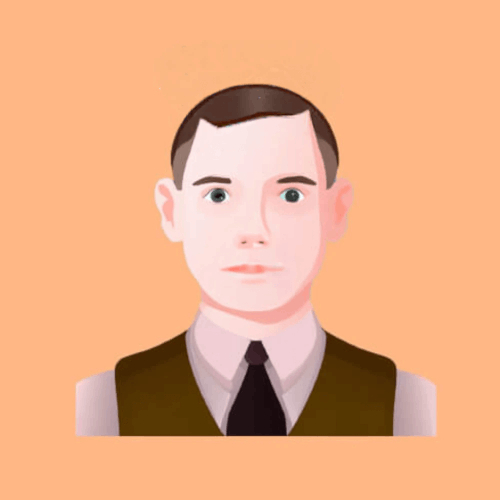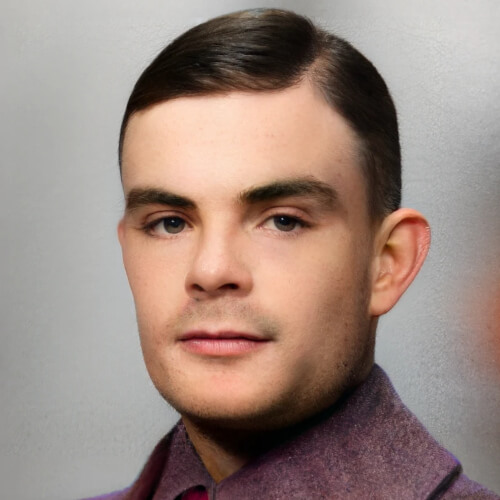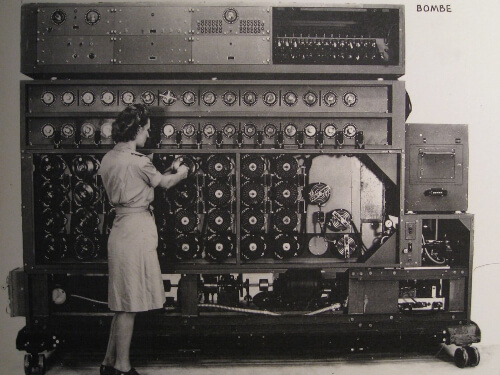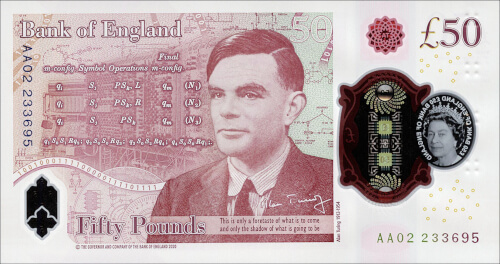



Alan Mathison Turing (23 June 1912 - 7 June 1954) was a British mathematician and scientist, today regarded as a pioneer of computer science and the father of artificial intelligence. During World War II, Turing led the development of an early computer that helped decipher the German Enigma code machine.
Turing was born in 1912 in London, England. His father, Julius Turing, was a civil servant who worked in India. His mother, Ethel Stoney, was the daughter of a railroad engineer. Turing had one older brother named John.
From a young age, Turing showed a keen interest in learning. He even taught himself to read and write before he started school. He especially had a passion for science, mathematics, puzzles, and patterns. As a boy, Turing attended different boarding schools where he performed well in his classes, but he often felt isolated and different from others. In 1931, he began studying mathematics at the University of Cambridge
In 1936, Turing wrote a paper that changed the world of science. He came up with the idea for an imaginary machine that could do any calculation as long as it had a set of rules. This device, later called the Turing machine, was a groundbreaking idea that helped describe the abilities of computing machines. They could, for example, not solve problems that had no clear rules, such as whether a mathematical statement is true or false.

During World War II, Turing worked for the British government at a secret location called Bletchley Park. There, he and other mathematicians tried to crack the codes that the German army was using to send secret messages. The Germans used a machine called the Enigma machine to make their messages almost impossible to decode.
Turing and his team created one of the first working electronic computers, called the Bombe, that was able to decode the messages. During 1940, 178 messages were decoded by at Bletchley park. This machine helped the Allies figure out the German army's plans and helped win the war.
In 1948, Turing moved to Manchester University, where he studied artificial intelligence and worked on building new computers. He also became interested in mathematical biology, which is about how math can explain how living things grow and change.
Despite his significant contributions to science, Turing faced personal challenges. He was gay, and during that time, being gay was considered illegal in Britain. In 1952, Turing was arrested and given a choice between going to prison or taking hormone injections that made him sick. He chose the injections. Sadly, in 1954, Turing died from cyanide poisoning, though it is still unknown if this was an accident or on purpose.
Turing was 25 when the Disney movie Snow White and the Seven Dwarfs came out in 1937. Captivated by the film, Turing reportedly saw it several times in theaters. He was particularly interested in the scene where the Evil Queen uses a potion to disguise herself as a witch—so much so that Turing supposedly tried to brew the potion in his own kitchen.
 In June 2021, the Bank of England began circulating its new £50 note, with a portrait of Queen Elizabeth II on the front and Alan Turing on the back. Turing was chosen over 227,299 total nominees to be featured on the note. Underneath his portrait is a quote from Turing: "This is only a foretaste of what is to come and only the shadow of what is going to be." The £50 note is the largest British bill in circulation.
In June 2021, the Bank of England began circulating its new £50 note, with a portrait of Queen Elizabeth II on the front and Alan Turing on the back. Turing was chosen over 227,299 total nominees to be featured on the note. Underneath his portrait is a quote from Turing: "This is only a foretaste of what is to come and only the shadow of what is going to be." The £50 note is the largest British bill in circulation.
Turing came in 5th place in the AAA marathon, a race so competitive it was used as a qualifying event for the 1948 Olympic games. His time was 2:46—not elite by modern standards, but at that time only 12 minutes slower than the Olympic gold medalist. Turing supposedly occasionally even ran the 64 km (40 mi) or so into London when he was needed for high-level government meetings.
During World War II, Turing became worried about the potential for a German invasion of England. In order to keep his life savings safe, he purchased two 90 kg silver bars and buried them in the woods near Bletchley Park. To further protect them, he only wrote their location down with a coded map—which he forgot how to read after the war was over.
First given in 1966, the ACM A.M. Turing Award is considered the highest honor in computer science. It's given every year by the Association for Computing Machinery (ACM) to a person or a group of people who have made major contributions to computer science. The prize includes a cash award of $1 million.
Some of the winners of the Turing Award include Donald Knuth, John McCarthy, Edsger Dijkstra, Vint Cerf, Tim Berners-Lee, and Shafi Goldwasser.